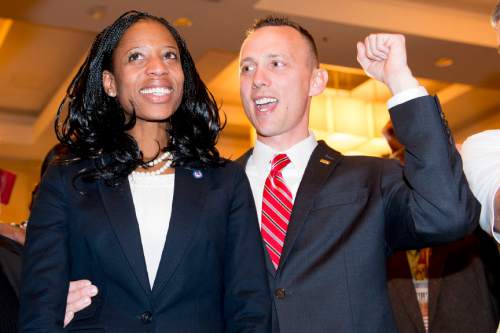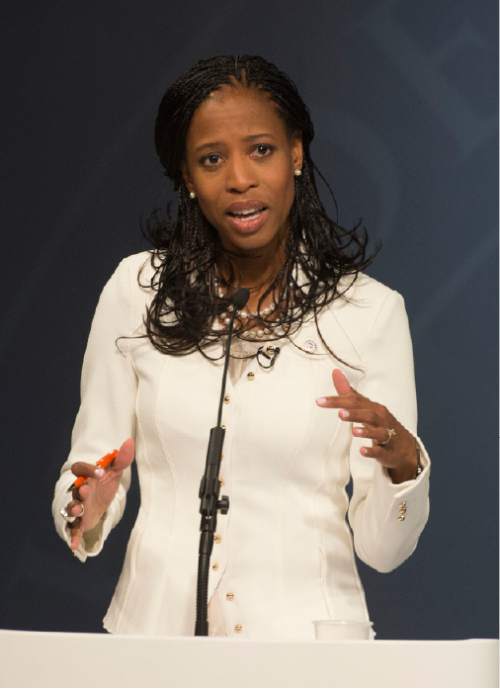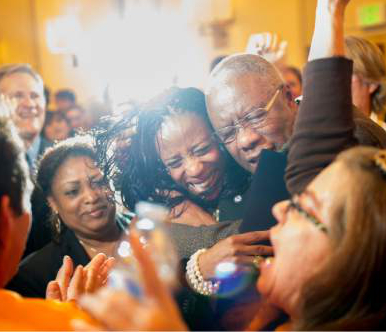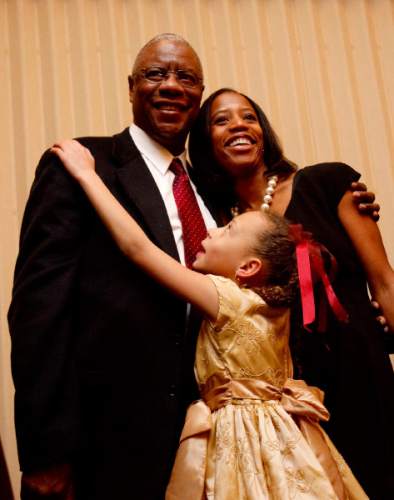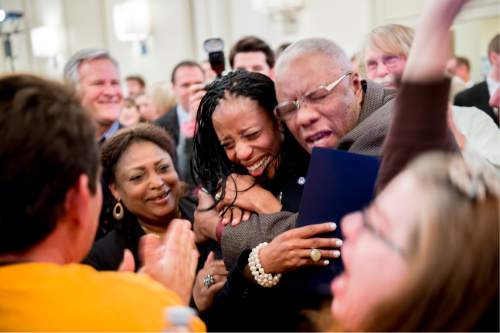This is an archived article that was published on sltrib.com in 2014, and information in the article may be outdated. It is provided only for personal research purposes and may not be reprinted.
Editor's note • This is the second in a series of occasional excerpts from "Mia Love: The Rise, Stumble and Resurgence of the Next GOP Star" by Tribune reporters Matt Canham, Robert Gehrke and Thomas Burr.
Maxime Bourdeau, the father of U.S. Rep.-elect Mia Love, celebrated the 40th anniversary of his immigration from Haiti in 2014. He arrived with little money but a wealth of optimism and resolve. His wife, Marie, joined him months later, and relatives helped ease their transition.
The Bourdeaus haven't been clear about the details of their visas; the comments they've made have been contradictory. But they agree that Mia's birth helped them remain in this country and, eventually, gain citizenship.
"My parents have always told me I was a miracle and our family's ticket to America," Love said.
Maxime Bourdeau put it this way: "I always tell Mia, 'You are my gift because you are born here.' … Mia is a citizen born in this country and at that time the country was favorable for children."
It appears they are referring to a lenient immigration law that was set to expire on Jan. 1, 1976, just 25 days after Mia was born. It benefited immigrants from within the Western Hemisphere who had a child in the United States. Her family would have been allowed to register her birth with the State Department and get preferential treatment in getting green cards, or permanent resident status, for the entire family, according to Margaret Stock, a Harvard-educated immigration attorney now living in Alaska.
Since at least 1924, the law has generally barred minor children from petitioning for permanent status for their parents.
"This was a very unique, unusual provision of the law that only existed briefly," Stock said.
Love has said her parents entered the country with tourist visas. If true, there's a flaw in her oft-repeated narrative that her family never ran afoul of U.S. immigration law. Tourist visas are short-term, and recipients are not allowed to work. Her parents had been in the country for two years by the time she was born, and they had jobs.
Bourdeau says he came here on a "residence visa" with the help of his family and that it allowed him to work legally. He recalls only that he signed the papers immigration agents asked him to sign and he provided the information they wanted. He never really understood the system or how it worked.
The family declined when asked to petition the federal government for the release of Bourdeau's immigration file.
Opponents have used the ambiguity to accuse Love of being "an anchor baby," a derisive and debasing term. Love dismisses talk of her parents' legal status as irrelevant: The United States government granted them citizenship, the trump card to end the conversation.
—
'What she can do for Haiti' •Bourdeau is 70 years old now, although he looks to be in his 50s. Only his cloudy, watery eyes betray his years. He's gregarious and proud, a storyteller who peppers his sentences with "you know what I mean" when he's searching for an elusive word in English, his third language.
A couple of years ago, he retired from a lifetime of maintenance jobs that allowed him to emerge out of poverty into a comfortable middle-class life. He still likes to tinker.
When inviting a reporter into his Stratford, Conn., home two months before the midterm election, he apologized and made room to sit at the kitchen table by pushing aside a dismantled water dispenser from his refrigerator that he was fixing, and an old worn Freemason handbook.
His white house sits on a corner lot in a middle-class neighborhood about halfway between Hartford, the state capital, and New York City. The walls hold art evoking his home country, such as one painting showing a woman balancing a basket on her head, along with numerous family photos, mostly of his three adult children.
As soon as his kids were old enough to listen, he told them they had to go to college and make a better, easier life than their parents had.
Those children graduated from college long ago. They have families and careers. They appear happy. What more could a father ask?
Bourdeau says he has lived his dream — and recently he has developed a new one.
He envisions his daughter slowly gaining influence within Congress, reaching a position that allows her to nudge and nurture Haiti toward a future with less poverty and more stability. For a man who smiles easily and often, this dream unfolds on his face in the biggest of grins.
"If, at some time in the future, Mia could make her country become my country, to bring a change in Haiti so people could have a better life, that would be noble and the name of the family would go far," he says.
He sees her collaborating with Haitian President Michel Martelly, who is nicknamed "Sweet Micky" from his days as a musician. Bourdeau considers Martelly an honorable man, a politician who is trying to help the people.
"I want Mia to meet him, to talk to him, help him to bring the country where he want to bring it," he said. "It's only America that give me that child. She is my hope. To see if she is in power, what she can do for Haiti."
—
Fear in Haiti • No country in the Western Hemisphere is poorer than Haiti. Almost 60 percent of its people live on less than $2 a day, and this widespread poverty has persisted for decades. A devastating earthquake in 2010 reduced many of the cinder-block homes to rubble and set back any hope for a modern-day revival.
Most of its population was enslaved or killed after Christopher Columbus' "discovery" of the island of Hispaniola in 1492 and the subsequent split of the territory with France. In 1804, the slaves revolted and Haiti became the world's first black republic.
While free, the nation never found a political equilibrium. Skin color still marked an ingrained class system. Mulattoes were often well-off and held key positions in business, politics and the military, while the black masses were mostly poor and repressed.
In 1957, a young man named François Duvalier emerged to lead a black movement, rallying black nationalists and voodoo practitioners, that would give him total control of Haiti.
Trained as a physician — including a stint in the United States — and nicknamed "Papa Doc," Duvalier quickly became one of the world's most reviled dictators, setting a course that would drive hundreds of thousands to flee Haiti.
Bourdeau and his family would be among them.
When he was 20, Bourdeau's family sent him from the family's plantation in Jérémie to Port-au-Prince to avoid arrest, or worse, at the hands of Papa Doc's personal security force, the Tonton Macoutes. The name derived from an old Haitian tale about a bogeyman who hunts down bad children and kidnaps them in a bag.
Bourdeau felt safe in the capital, for the most part. But one night as he left a movie theater, a Tonton Macoute chased him down a dark alley. Bourdeau went left at a fork and, a few seconds later, his pursuer went right. He crawled into a drainage pipe and hid for the next few hours, standing in filthy, stinking water with rats at his feet.
"Maybe God want me to go there," he said.
—
'I want to own' • A Catholic, Bourdeau wears a gold cross around his neck and speaks often about following the path that the Lord set out for him. Marie Lourdes Dorelien, 19, was working as a receptionist in a Catholic school when Bourdeau, who was 26, became smitten. The two wed about a year later.
Port-au-Prince suffered from rampant unemployment and Bourdeau was never able to find steady work. The couple lived on money from his upper-middle-class family and Marie Bourdeau's wages.
Some of his aunts and uncles, and his older sister Claude Marie, had previously emigrated to the United States, as had some of Marie Bourdeau's extended family. These relatives, along with his parents, helped him get a visa. He left immediately, in August 1974, even though it meant leaving behind his wife, his son Jean, and new daughter Cynthia, who was just a couple of days old.
He found work at a New Jersey plant making metal mirror frames and, living with his family in Brooklyn, started to save his money.
Within a year, Marie Bourdeau joined him. But it would be five years before they were reunited with their two children, whom they left in the care of her uncle, Father Gabriel Albert Dorelien.
On Dec. 6, 1975, the Bourdeaus had their third child and named her Ludmya. They called her Mia for short. When Jean and Cynthia arrived, at ages 7 and 5, they were surprised that their parents were less affluent in the United States than Father Dorelien was in Haiti. There was no big house or nannies. Their parents worked long hours.
But the family's life was full of Creole food and Haitian music, gatherings with a boisterous extended family and Catholic services, summer trips to their parents' homeland — and long lectures from Bourdeau about his expectations for them in America.
Marie Bourdeau took care of her children's daily needs, from meals to clothes to their health, a role she maintained while working full time, first as a housekeeper and eventually as a nursing assistant. The kitchen was her sanctuary, and she enjoyed cooking for a crowd. She'd often have as many as 20 people over for Sunday dinner, serving meat-filled pastries, rice and Creole stews. Mia's favorite was mayi moulen, a ground-up corn dish, softer than polenta, that her mother would cover in an onion-infused sauce.
Bourdeau wanted the children to go to college. He placed them in a Catholic elementary school, dropping them off in the mornings and helping with their homework each night.
He forbade them from playing with the kids in their neighborhood, recalling his childhood in Haiti where all it took was one arrest for something as minor as shoplifting to be ostracized for life. Instead, he drove them to the nicer parts of town to meet with friends.
He would tell them that they would never have to beg or borrow. They were required to earn what they owned, and they would shame him if they leaned on the government for help. He was poor and would accept unemployment benefits, but he wouldn't take food stamps or subsidized school lunches for his kids. He didn't want his children to even ride the school bus, expressing pride that either he or his wife drove them and picked them up each day.
"Charity is some kind of deception for you and for me," he said. "I don't want to ask; I want to own."
Each parent would work either second jobs or odd jobs — painting, driving a school bus, doing janitorial work — as the couple saved to buy their first home.
—
American citizenship and politics • Bourdeau wanted his children to be all American, but he also wanted them to take pride in Haiti and understand its history. He'd tell them how the slaves fought for their independence against France and how the country fell into the hands of dictators.
The family members had been reunited for a few years when Bourdeau petitioned to turn their permanent resident status into citizenship. It took six months for the government to say the Bourdeaus had passed the test and cleared every hurdle. All that remained was the citizenship ceremony, held in a courtroom in Bridgeport, Conn., in 1984.
Love doesn't remember the occasion — she thought her parents were citizens before her siblings moved to the United States.
Bourdeau, who dropped out of school at 16, may not have been formally educated, but he was worldly. He paid close attention to politics in the United States and internationally, though his kids, particularly Mia, showed no interest in current affairs.
Her brother, Jean, remembers the TV was always turned to a news show. Her sister remembers her father saying Democrats were most likely to help minorities like them. "I just remember that we had to be Democrats," Cynthia said.
That said, the first vote Bourdeau cast was for President Ronald Reagan. He liked Reagan's tough stance against the Soviet Union.
"That was my man," Bourdeau said. "I'll love that vote forever."
He said he's voted for Democrats, too, including President Barack Obama, but said he's never been much of a partisan.
Mia stayed out of the political conversations, but she shared one of her father's other passions — music. It was at the heart of her dream for the future, and it had nothing to do with running for political office. —
Tribune's book on Mia Love
O A news article is often called the first draft of history. The Salt Lake Tribune is providing a second draft of Mia Love's story, a deeper look at events that brought her to the halls of Congress. To buy "Mia Love: The Rise, Stumble and Resurgence of the Next GOP Star," visit http://www.mialovebook.com.


